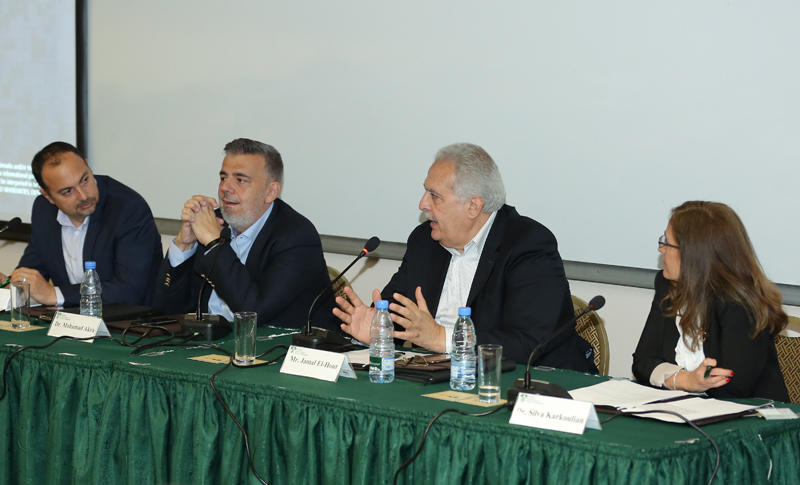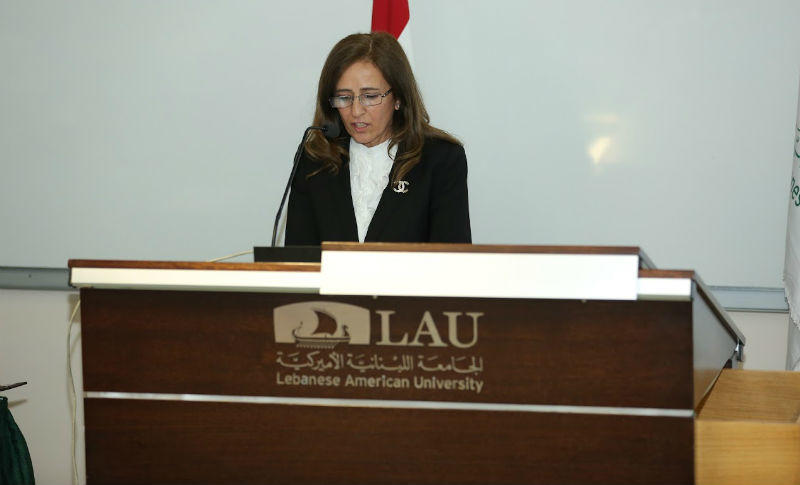Teaching the Next Generations Transformational Technology
Panel discussion covers new – and sometimes baffling – technology.
In previous generations, or even just a decade ago, much of what is becoming the norm today would have been considered science fiction. Technology is developing so fast, it can sometimes feel like it’s difficult to keep up.
With this brave new world in mind, LAU held a panel discussion Wednesday at the Adnan Kassar School of Business on generational transforming technology. At the evening session, which was sponsored by Byblos Bank, business and technology experts discussed the Third Industrial Wave, the Internet of Things, and blockchain.
Silva Karkoulian, professor and chair of the Department of Management Studies at AKSOB, introduced the speakers and their subjects. She asked the audience to “Imagine a future where people get to participate or keep the value that they have created by eliminating the middleman.” That world is coming, she said, citing examples of technologies that hold vast promise for some businesses but that can disrupt entire industries.
The panel experts agree with Karkoulian that we will soon live in a very different world. They said new technologies with massive calculation power, shared driverless cars (substantially reducing congestion), automated drug administration, and big data will affect nearly every aspect of our daily lives.
“I used to have to wait every year to attend COMDEX [an annual week-long technology convention that started in the late 1970s]. Now I get real-time information about what’s happening in the world,” said Mohamad Akra, chairman and CEO of Banan Information Technology and a post-doctoral research fellow at Massachusetts Institute of Technology. His discussion touched on Artificial Intelligence (AI) and the Internet of Things (IOT) – the concept of attaching everyday objects to computerized instructions.
“Industry 4.0 means we won’t need our muscles anymore,” he said jokingly during his presentation, noting that the development of AI and IOT is accelerating mass usage due to the improvement of sensor technology.
Another largely hyped but little understood concept is blockchain, a decentralized digital ledger that publicly and permanently records all transactions. Until recently, it has almost exclusively been associated with the crypto-currency Bitcoin. But the computerized public ledger that was developed alongside the digital currency is increasingly being seen as a useful tool for other industries, such as traditional banking, academia and governments.
Tarek Bohsali, digital advisory services lead at Microsoft in Africa and the Eastern Mediterranean, and the blockchain technology practice lead within MEA Digital Advisory Services, described the new and future uses of the tool as “blockchain 2.0.” This could include smart business contracts, “know your customer” (called KYC, and targeted at banks), and general financial transactions.
“Why can’t we take this innovation and apply it to other things?” said Bohsali in his presentation. “If a business process involves several parties that don’t trust each other, blockchain might be a good scenario for them.”
After the panel discussion, he said, “This topic is difficult to understand for the general population, but it’s important for people, especially young people, to understand and learn about blockchain, or at least to be taught how to learn on their own, come up with ideas, and hopefully build something out of it.”
For his presentation, Adjunct Professor and Co-Founder of energy company Creative Power Solutions Jamal El Hout spoke about the Third Industrial Wave, which refers to the convergence of a number of technologies, processes and web-based services. This new reality means a new economy based on brainpower rather than manpower, which will undoubtedly upend many political, financial and social systems in economies across the world.
Khaled Mehio, a new LAU MBA graduate, said he was happy to get an overview of information that might otherwise be challenging to access.
“The way the material was presented was amazing. They talked about advanced things that I wasn’t aware before, and they delivered the information in a simple and direct way.”

